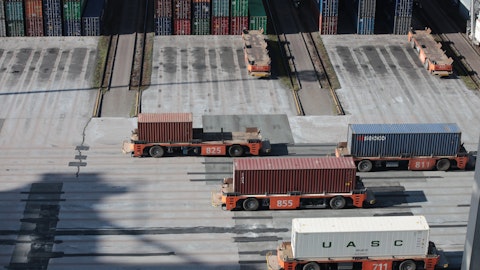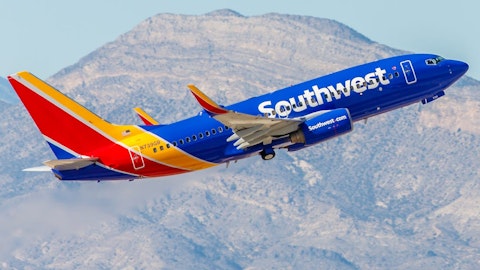Ed Bastian: Well, if you saw my comments this morning on CNBC. I think it’s very clear that there has to be a call to action amongst our political leaders, the Congress and the White House to fund and properly provide the FAA the resources they need to do the job. We have long talked about the need for modernization of our air traffic control systems. I think this is a crystal clear example of the challenge the FAA has faced when you have aging systems that aren’t as resilient as they need to be. You have tools and technologies that are somewhat outdated and staffing levels, not where they need to be. So FAA I know is doing the very best they can with what they have, but we need to stand behind the FAA and we need to take them off the kind of year-by-year funding that seems like they go through that’s caught up in political negotiations and realize the importance of having a strong aviation infrastructure and the importance of that to our economy, as well as our public.
Claire Bushey: Thank you.
Operator: Thank you. Your next question is coming from Alison Sider from Wall Street Journal. Your line is live.
Alison Sider: Hey. Thanks so much. I guess sort of a related question, but I guess curious, how much do you think that the infrastructure and aerospace issues are likely to be a constraint on growth for the industry overall, whether it vulnerability of technical systems and lack of redundancy or just controller staffing or what have you, how impactable do you expect that to be going forward?
Ed Bastian: Well, it’s according constraint on our ability to grow as an industry. You see the length of flight times they are taking to complete missions. You see the some of the challenges the air traffic control — controllers have when you get into congested space in the Northeast or down in Florida. There’s been a lot — it’s just even during the pandemic itself some real challenges that we have experienced. So there’s no question that the investment in a modernized air traffic control system will drive a tremendous amount of efficiencies, as well as growth, which will mean better service for the American public.
Alison Sider: Thanks. And I guess can you talk a little bit about sort of what sort of systems or backup or its own redundancy Delta has, like if there was another outage of the NOTAM system like we saw earlier this week? Is that something that Delta can kind of deal with or work around or is that something you need to have or, yeah, there’s anything you can share on that?
Ed Bastian: Yeah. The NOTAM system that went down is an essential system and no airline would fly without having that capability. Interestingly, at Delta, we had and have a long — a fairly old backup technology that does see that and we were able to keep some of the NOTAM information flowing to Delta. So we probably had a little better opportunity to fly during this stoppage as compared to anyone else, but out of deference to the FAA and making certain that we gave them the ability to make the decisions we didn’t utilize that backup system. But it’s an important part of our resiliency and redundancy.
Alison Sider: Thank you.
Operator: Thank you. Your next question is coming from Kelly Yamanouchi from the Atlanta Journal Constitution. Your line is live. Kelly Yamanouchi, your line is live. Your next question is coming from Mary Schlangenstein from Bloomberg News. Your line is live.
Mary Schlangenstein: Hi. Thank you. I just wanted to see if I could get you to talk a little bit more about your comments about business bookings remaining steady. It seems like the 80% recovered level in the December quarter is what you had been saying previous to that and I wanted to see if you have got any sort of an outlook beyond the March quarter that gives you confidence that, that corporate recovery is not going to stall at some level?





